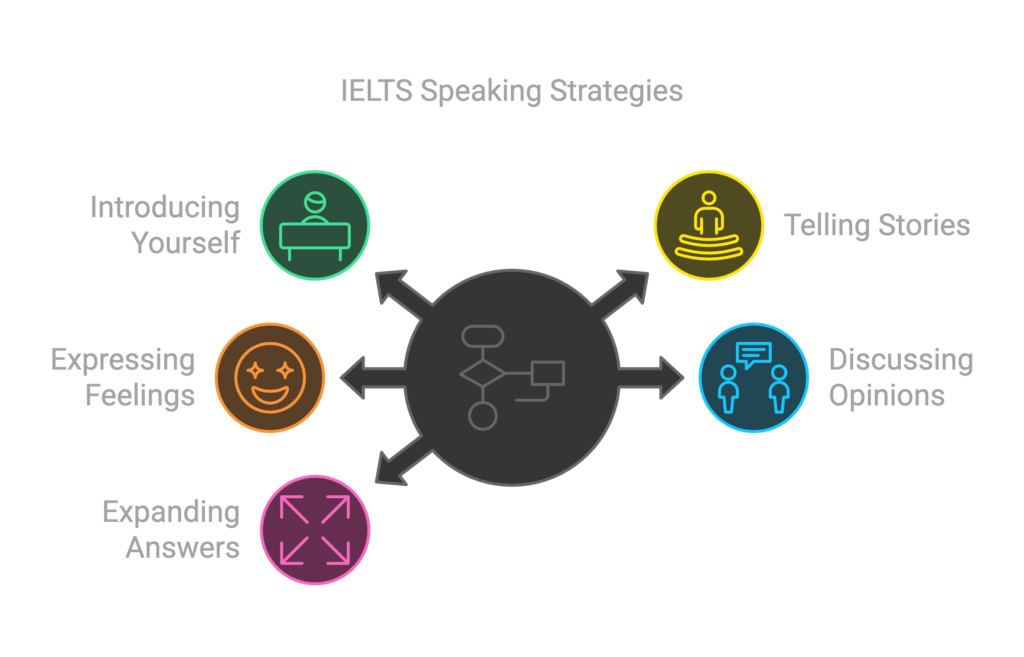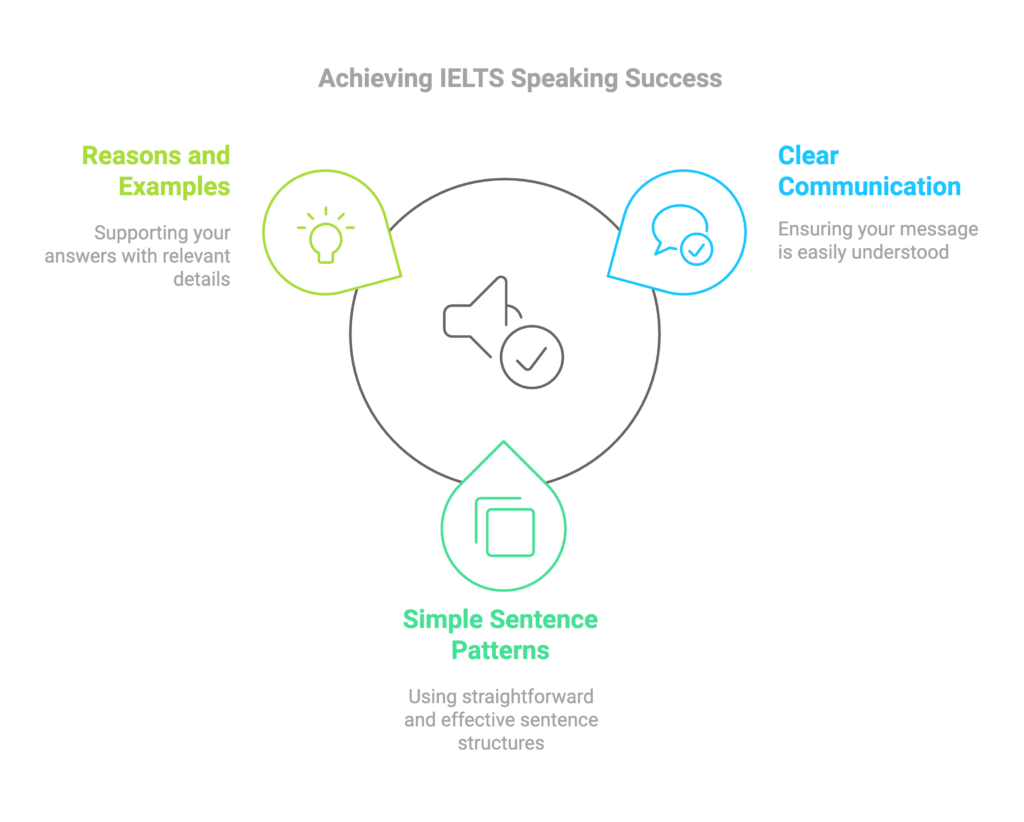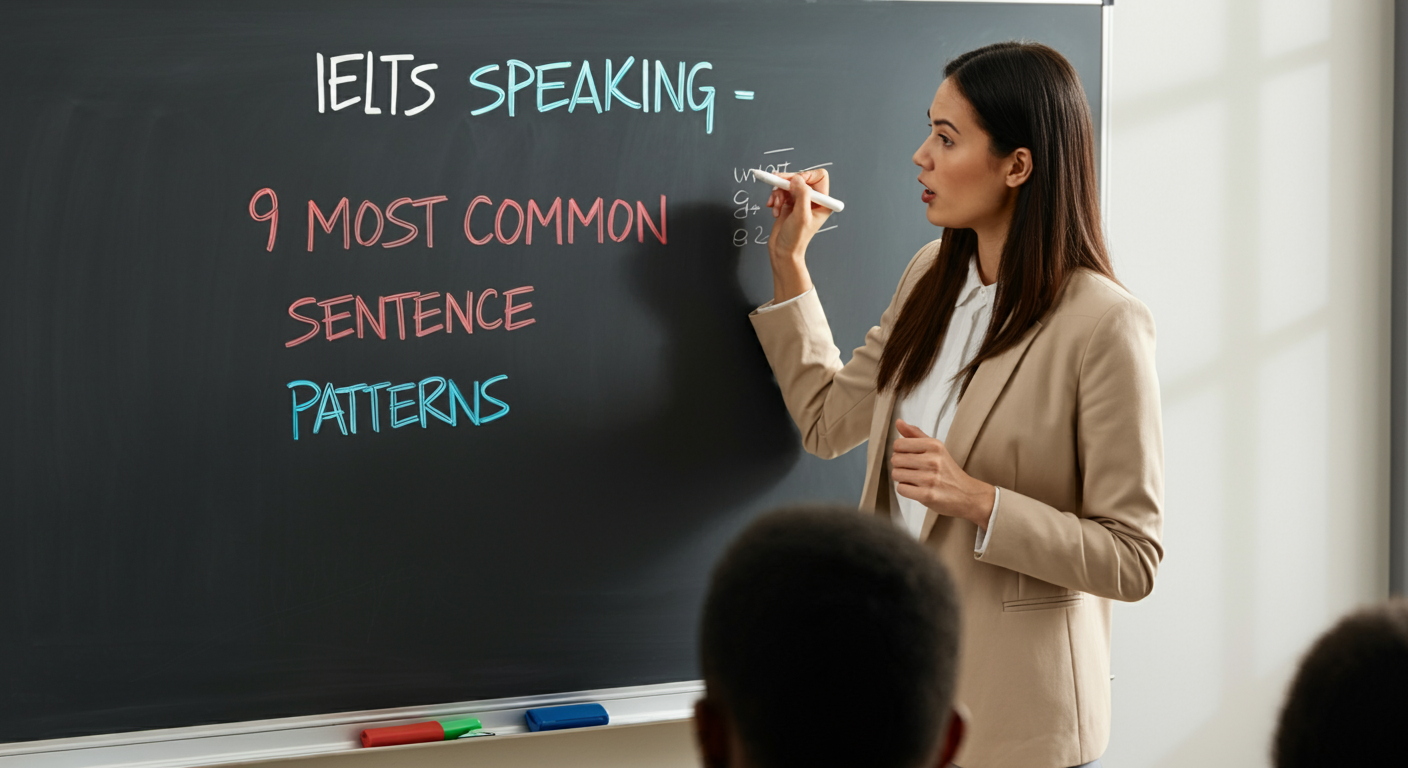Are you aware that employing straightforward yet impactful sentence structures can assist you in attaining a Band 7, 8, or even 9 on the IELTS Speaking test? Through examining countless high-scoring IELTS answers, language specialists have pinpointed the 9 most prevalent sentence patterns utilized by top achievers.
In this post, we’ll explore how to use these patterns effectively and why simpler sentences can be more powerful than complex structures when aiming for a high score.
Why Simple Sentence Patterns Work
Many students believe using advanced vocabulary and complex grammar guarantees a higher IELTS score. However, experienced IELTS examiners have revealed that clarity, accuracy, and appropriateness are more important than complexity.
Let’s dive into the 9 most common sentence patterns used by Band 7+ students and learn how you can use them to ace your IELTS Speaking test.

Part 1: Introducing Yourself
1. “I’m a…” (Occupation/Role)
When asked “Do you work or study?”, the most common response from Band 7-9 candidates is:
“I’m a teacher.”
Why it works:
✅ It’s simple, direct, and grammatically correct.
Avoid:
❌ Overcomplicating answers like:
“My role entails teaching students of various ages.”
2. “I’m from…” (Location)
When asked “Where are you from?”, top-performing students say:
“I’m from London.”
Why it works:
✅ It’s clear and natural.
❌ Avoid using overly formal phrases like:
“I hail from London.”
3. “I like…” (Preferences)
When asked about hobbies or preferences, high-scoring students say:
“I like reading books.”
Why it works:
✅ It’s simple, clear, and easy to expand by adding reasons or examples.
Avoid:
❌ Unnecessary complexity like:
“I am particularly fond of immersing myself in literary works.”

Part 2: Telling Stories (Narrative Tenses)
4. “We went to…” (Past Simple)
When describing past experiences in Part 2, top IELTS performers use the past simple tense:
“We went to Paris for our honeymoon.”
Why it works:
✅ Past simple is the easiest and clearest way to describe past actions.
Avoid:
❌ Complicated tenses like:
“We had been going to Paris before deciding to visit Rome.”
5. “I was watching TV when…” (Past Continuous)
To describe a past action interrupted by another action, use the past continuous:
“I was watching TV when the phone rang.”
Why it works:
✅ It sets the scene and shows a more advanced tense naturally.
Avoid:
❌ Incorrect tense combinations like:
“I watched TV when the phone rang.” (This indicates sequential actions, not interruption.)
Part 2: Expressing Feelings
6. “I was over the moon.” (Idiomatic Expressions)
When describing how something made you feel, use accurate idiomatic expressions:
“I was over the moon when I got the job offer.”
Why it works:
✅ It’s idiomatic but still simple and relevant.
Avoid:
❌ Incorrect idiom usage like:
“I was over moon.” (The correct idiom is “over the moon.”)
❌ Memorized phrases like:
“Words cannot describe the depths of my feelings.” (This sounds unnatural and rehearsed.)

Part 3: Discussing Opinions and Ideas
7. “In my opinion…” (Expressing Opinions)
When requested to share your views in Part 3, utilize:
“In my opinion, technology has improved our lives in many ways.”
Why it works:
✅ It’s direct, easy, and accurate.
Avoid:
❌ Using overly formal phrases like:
“It is my firm belief that technology has significantly advanced human civilization.”
8. “Because…” (Explaining Reasons)
To explain why you believe something, use:
“I think public transportation should be improved because it reduces traffic congestion.”
Why it works:
✅ “Because” is the most natural way to explain reasons.
Avoid:
❌ Complex alternatives like:
“The reason being that public transportation mitigates vehicular traffic.”
Part 3: Expanding Answers
9. “For example…” (Giving Examples)
To expand your answers further, use:
“Many people enjoy outdoor activities. For example, hiking and cycling are quite popular.”
Why it works:
✅ It extends your response while keeping it natural and clear.
Avoid:
❌ Replacing “for example” with incorrect expressions like:
“In a nutshell, hiking is fun.” (This summarizes instead of explaining.)
Key Takeaway: Don’t Memorize, Communicate!

Experienced IELTS examiners suggest that memorizing intricate sentence structures may negatively impact your score. The focus of the IELTS Speaking test is on effective communication rather than demonstrating advanced grammar or vocabulary.
Use these 9 simple sentence patterns naturally, expand your answers with reasons and examples, and focus on being clear and accurate.
Call to Action:
Ready to improve your IELTS Speaking skills? Download the Langujet App to practice IELTS Speaking tasks, receive real-time feedback, and track your progress toward a Band 7, 8, or 9.
Start practicing today! Clear communication leads to higher scores! 🚀



